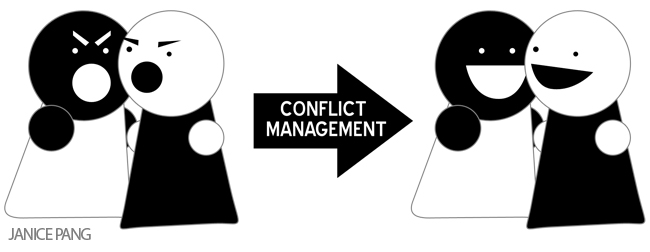
For violating the student code of conduct, students face consequences ranging from serious talks from teachers, to social probation, to suspensions. Many of these violations stem from conflicts that students face in and outside of school.
Though the term “conflict” does encompass a broad variety of problems including firearm possession, family problems, sexual assault, and drug possession, a very common one at Aragon is relationship conflict between friends. It is important to note, however, that conflicts are not all similar and they differ from student to student.
A majority of the information concerning fights, suspensions, and overall conflicts at Aragon is kept strictly confidential by school administration for privacy reasons. Statistics, experience and direct consequences stemming from past conflicts are not publicly disclosed. Likewise, conflicts and the way they are dealt with is a touchy subject amongst students. However, safety and health counselor Sarah Korsunsky is open about her management of student issues.
Following a conflict, students are sometimes required by the administration to have a mediation session with Korsunsky but sometimes talk with her by choice. During these mediation sessions, Korsunsky facilitates conversation between two people about the problem at hand with the ultimate goal being an arrival at a resolution. Regarding the mediation sessions, Korsunsky says, “[We] do it as soon as a conflict starts happening.”
There is a pattern amongst these conversations. Korsunsky notes, “[Oftentimes] one person thought something had happened when it hadn’t. Many conflicts between friends are from misinterpretations, not what the person intended.”
There still remains the problem with conflicts that are begun intentionally. Yet, Korsunsky says, “[Conflicts] between friends [are] even more intense; when you know someone better you know how to hurt them more.” However, she also states, “[Between friends there is] more motivation to work on relationships.”
At times, students brought in for mediation sessions may come in resistant to conversation. Korsunsky says, “[It] does end up being a choice private conversation; once students understand that, they feel more comfortable.”
That is not to say that mediation is a definite solution for conflicts at Aragon. Korsunsky says, “If it is not working, then we don’t .” The most mediation sessions Korsunsky has had to facilitate for one group, though, is merely two.
Though the sessions may become emotionally heated, the sessions are otherwise kept peaceful. Korsunsky says, “[I’ve] never had students hit each other [during mediation].”
Students have also looked to other methods to help resolve their conflicts. Some students have resorted to the administration and police in order to attempt remediation of their conflicts. Others have chosen to “remain passive” or have merely forgiven and relinquished their problems without the need for heated confrontation or mediation sessions.
Others have chosen to “remain passive” or have merely forgiven and relinquished their problems without the need for heated confrontation or mediation sessions. Junior Vincent Tong says, “I felt an infinite amount of rage,” after his lunch was knocked over by a classmate nearby. He says, “He just spontaneously knocked over my bowl. I had multiple suppressed arguments within me.” Though agitated, Tong says, “I chose to be passive in order to avoid a confrontation.”
Though there are many options in dealing with conflict, the counseling office is open to all seeking help with any personal problems or issues with others. Overall, Korsunsky says of conflicts, “Change, if it is lasting, has to come from within. That is why I work very closely with administrators.”




